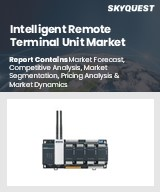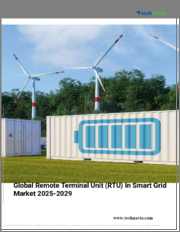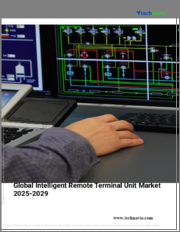
|
시장보고서
상품코드
1675688
지능형 원격단말장치(iRTU) 시장 : 제품 유형별, 최종사용자별, 지역별(2025-2033년)Intelligent Remote Terminal Unit Market by Product Type (Wired Intelligent RTU, Wireless Intelligent RTU), End User (Oil and gas, Power, Chemical, Water and wastewater, and Others), and Region 2025-2033 |
||||||
지능형 원격단말장치(iRTU) 세계 시장 규모는 2024년 35억 달러에 달했으며, IMARC Group은 2025년부터 2033년까지 4.86%의 연평균 성장률(CAGR)로 2033년에는 53억 달러에 달할 것으로 예측했습니다. 전력 소비의 대폭적인 증가, 급속한 산업화, 담수 공급에 대한 수요 증가가 시장을 주도하는 주요 요인으로 작용하고 있습니다.
iRTU(Intelligent Remote Terminal Unit)는 인터넷을 통해 자동화를 위한 다양한 장비 및 시스템의 원격 모니터링에 사용되는 마이크로프로세서 기반의 전자 장치로, 디지털 및 아날로그 필드 파라미터를 모두 모니터링하고 모니터링 제어 및 데이터 수집(SCADA) 마스터 스테이션으로 데이터를 전송합니다. iRTU는 데이터 입력 스트림을 출력 스트림에 연결하고, 설치 문제를 해결하고, 통신 프로토콜을 정의하는 설정 소프트웨어를 실행합니다. iRTU는 석유화학(석유), 정제, 원자력, 화학, 하수처리, 수처리 플랜트 등 다양한 공정에서 널리 사용되고 있습니다. 널리 채택되고 있습니다. 이 외에도 iRTU는 농업, 품질 관리, 식품 가공, 자동차 제조, 의약품 제조 공정에서도 사용되고 있습니다. 현재 iRTU 제공업체들은 더 많은 고객을 유치하고 수익을 극대화하기 위해 보다 효율적인 솔루션 개발에 주력하고 있습니다.
지능형 원격 터미널 유닛(iRTU) 시장 동향 :
현재 인구 증가와 산업화에 따른 전력 소비의 대폭적인 증가는 시장에 긍정적인 영향을 미치는 주요 요인 중 하나입니다. 잦은 정전 문제를 방지하기 위한 전력 인프라의 개발도 송전 및 배전 네트워크의 효율성을 개선하기 위해 iRTU의 활용을 촉진하고 있습니다. 또한, 다양한 산업, 특히 자산 집약적 산업에서 원격 모니터링(RPM) 시스템 채택이 증가하고 있는 것도 시장 전망을 밝게 하고 있습니다. 이러한 산업은 전력 변동으로 인해 중요한 장비의 기능이 손상되어 상당한 수익 손실이 발생하기 때문에 높은 운영 효율을 달성하는 데 어려움을 겪고 있습니다. 또한, 도시 지역의 담수 공급에 대한 수요 증가와 수질 오염 수준 증가는 전 세계적으로 iRTU에 대한 수요를 자극하는 또 다른 요인으로 작용하고 있습니다. 상수도 사업자들은 혁신적인 기술에 지속적으로 투자하고 있으며, SCADA 시스템을 활용하여 물 인프라 모니터링 능력을 강화하고 수처리 플랜트의 주요 자산을 모니터링하고 있습니다. 또한, 소비자의 선호도가 전기자동차(EV)로 바뀌면서 유해한 배출을 최소화하고 환경 위생을 지원하는 전기자동차(EV)로의 전환과 재생에너지의 통합으로 인해 기존 송배전 자산에 큰 부담을 주고 있습니다. 이에 따라 기존 전력망을 스마트 그리드로 전환할 필요성이 높아지고 있습니다. 또한, 많은 국가에서 스마트그리드 프로젝트가 증가함에 따라 SCADA 시스템에 대한 수요가 증가하여 시장 성장을 가속할 것으로 예상됩니다.
본 보고서에서 다룬 주요 질문
- 전 세계 지능형 원격단말장치(iRTU) 시장 규모는 어느 정도인가?
- 2025-2033년 세계 지능형 원격단말장치(iRTU) 시장의 예상 성장률은?
- 세계 지능형 원격단말장치(iRTU) 시장을 이끄는 주요 요인은?
- 코로나19가 세계 지능형 원격단말장치(iRTU) 시장에 미치는 영향은?
- 세계 지능형 원격 단말장치(iRTU) 시장의 제품 유형별 시장 현황은?
- 세계 지능형 원격 단말장치(iRTU) 시장의 최종 사용자별 시장 현황은?
- 세계 지능형 원격단말장치(iRTU) 시장의 주요 지역은?
- 세계 지능형 원격단말장치(iRTU) 시장의 주요 기업은?
목차
제1장 서문
제2장 조사 범위와 조사 방법
- 조사 목적
- 이해관계자
- 데이터 소스
- 1차 정보
- 2차 정보
- 시장 추정
- 보텀업 접근
- 톱다운 접근
- 조사 방법
제3장 주요 요약
제4장 서론
- 개요
- 주요 업계 동향
제5장 세계의 지능형 원격단말장치(iRTU) 시장
- 시장 개요
- 시장 실적
- COVID-19의 영향
- 시장 예측
제6장 시장 분석 : 제품 유형별
- 유선 지능형 RTU
- 무선 지능형 RTU
제7장 시장 분석 : 최종사용자별
- 석유 및 가스
- 전력
- 화학제품
- 물 및 폐수
- 기타
제8장 시장 분석 : 지역별
- 북미
- 미국
- 캐나다
- 아시아태평양
- 중국
- 일본
- 인도
- 한국
- 호주
- 인도네시아
- 기타
- 유럽
- 독일
- 프랑스
- 영국
- 이탈리아
- 스페인
- 러시아
- 기타
- 라틴아메리카
- 브라질
- 멕시코
- 기타
- 중동 및 아프리카
- 시장 내역 : 국가별
제9장 성장 촉진요인 및 억제요인, 기회
- 개요
- 성장 촉진요인
- 성장 억제요인
- 기회
제10장 밸류체인 분석
제11장 Porter의 Five Forces 분석
- 개요
- 바이어의 교섭력
- 공급 기업의 교섭력
- 경쟁 정도
- 신규 진출업체의 위협
- 대체품의 위협
제12장 가격 분석
제13장 경쟁 구도
- 시장 구조
- 주요 기업
- 주요 기업 개요
- Advantech Co. Ltd.
- Emerson Electric Co.
- General Electric Company
- Hitachi Energy Ltd.(Hitachi Ltd.)
- Honeywell International Inc.
- Rockwell Automation Inc.
- Schneider Electric SE
- Siemens AG
- Yokogawa Electric Corporation
The global intelligent remote terminal unit market size reached USD 3.5 Billion in 2024. Looking forward, IMARC Group expects the market to reach USD 5.3 Billion by 2033, exhibiting a growth rate (CAGR) of 4.86% during 2025-2033. Significant rise in electricity consumption, rapid industrialization, and the growing demand for freshwater supplies represent some of the key factors driving the market.
An intelligent remote terminal unit (iRTU) is a microprocessor-based electronic equipment used for remote monitoring of various devices and systems for automation via the internet. It monitors both the digital and analog field parameters and transmits data to a supervisory control and data acquisition (SCADA) master station. It runs setup software to connect data input streams to output streams, troubleshoot installation problems, and define communication protocols. It is widely employed in several processes, including petrochemical (oil) and refineries and nuclear power, chemical, sewage treatment and water treatment plants. Besides this, iRTU is used in agriculture, quality control, food processing, automobile manufacturing, and pharmaceutical manufacturing processes. At present, iRTU providers are focusing on developing more efficient solutions to attract more customers and maximize revenue.
Intelligent Remote Terminal Unit Market Trends:
Presently, a considerable increase in electricity consumption on account of the growing population and industrialization represents one of the key factors positively influencing the market. The development of power infrastructure to prevent frequent power outage problems is also driving the usage of iRTUs to improve the efficiency of the transmission and distribution network. In addition, the increasing adoption of remote monitoring (RPM) systems by various industries, especially asset-intensive industries, is creating a positive market outlook. These industries are facing the difficulty of achieving high operating efficiency due to power fluctuations that damage the functioning of important equipment, resulting in significant revenue loss. Furthermore, the growing demand for freshwater supplies in urban areas and the rising water pollution level are other factors catalyzing the demand for iRTUs worldwide. Water utilities are continuously investing in innovative technologies and utilizing SCADA systems to enhance water infrastructure monitoring capabilities and monitor important assets of water treatment plants. Moreover, the shifting consumer preferences towards electric vehicles (EVs) to minimize harmful emissions and support environmental health, along with the integration of renewable energy, is creating a massive load on existing power transmission and distribution assets. Consequently, there is an increase in the need for converting conventional grids to smart grids. Furthermore, the rising number of smart grid projects across numerous countries is expected to drive the demand for SCADA systems and, in turn, propel the market growth.
Key Market Segmentation:
Product Type Insights:
- Wired Intelligent RTU
- Wireless Intelligent RTU
End User Insights:
- Oil and gas
- Power
- Chemical
- Water and wastewater
- Others
Regional Insights:
- North America
- United States
- Canada
- Asia Pacific
- China
- Japan
- India
- South Korea
- Australia
- Indonesia
- Others
- Europe
- Germany
- France
- United Kingdom
- Italy
- Spain
- Russia
- Others
- Latin America
- Brazil
- Mexico
- Others
- Middle East and Africa
- The report has also provided a comprehensive analysis of all the major regional markets that include North America (the United States and Canada), Asia Pacific (China, Japan, India, South Korea, Australia, Indonesia, and others), Europe (Germany, France, the United Kingdom, Italy, Spain, Russia, and others), Latin America (Brazil, Mexico, and others), and the Middle East and Africa. According to the report, Europe was the largest market for intelligent remote terminal unit. Some of the factors driving the Europe intelligent remote terminal unit market included the expansion of numerous industries, the increasing need for power and water supply across residential and commercial sectors, and various smart grid projects.
Competitive Landscape:
- The report has also provided a comprehensive analysis of the competitive landscape in the global intelligent remote terminal unit market. Detailed profiles of all major companies have also been provided. Some of the companies covered include Advantech Co. Ltd., Emerson Electric Co., General Electric Co., Hitachi Energy Ltd. (Hitachi Ltd.), Honeywell International Inc., Rockwell Automation Inc., Schneider Electric SE, Siemens AG, Yokogawa Electric Corporation, etc. Kindly note that this only represents a partial list of companies, and the complete list has been provided in the report.
Key Questions Answered in This Report
- 1.How big is the global intelligent remote terminal unit market?
- 2.What is the expected growth rate of the global intelligent remote terminal unit market during 2025-2033?
- 3.What are the key factors driving the global intelligent remote terminal unit market?
- 4.What has been the impact of COVID-19 on the global intelligent remote terminal unit market?
- 5.What is the breakup of the global intelligent remote terminal unit market based on the product type?
- 6.What is the breakup of the global intelligent remote terminal unit market based on the end user?
- 7.What are the key regions in the global intelligent remote terminal unit market?
- 8.Who are the key players/companies in the global intelligent remote terminal unit market?
Table of Contents
1 Preface
2 Scope and Methodology
- 2.1 Objectives of the Study
- 2.2 Stakeholders
- 2.3 Data Sources
- 2.3.1 Primary Sources
- 2.3.2 Secondary Sources
- 2.4 Market Estimation
- 2.4.1 Bottom-Up Approach
- 2.4.2 Top-Down Approach
- 2.5 Forecasting Methodology
3 Executive Summary
4 Introduction
- 4.1 Overview
- 4.2 Key Industry Trends
5 Global Intelligent Remote Terminal Unit Market
- 5.1 Market Overview
- 5.2 Market Performance
- 5.3 Impact of COVID-19
- 5.4 Market Forecast
6 Market Breakup by Product Type
- 6.1 Wired Intelligent RTU
- 6.1.1 Market Trends
- 6.1.2 Market Forecast
- 6.2 Wireless Intelligent RTU
- 6.2.1 Market Trends
- 6.2.2 Market Forecast
7 Market Breakup by End User
- 7.1 Oil and gas
- 7.1.1 Market Trends
- 7.1.2 Market Forecast
- 7.2 Power
- 7.2.1 Market Trends
- 7.2.2 Market Forecast
- 7.3 Chemical
- 7.3.1 Market Trends
- 7.3.2 Market Forecast
- 7.4 Water and Wastewater
- 7.4.1 Market Trends
- 7.4.2 Market Forecast
- 7.5 Others
- 7.5.1 Market Trends
- 7.5.2 Market Forecast
8 Market Breakup by Region
- 8.1 North America
- 8.1.1 United States
- 8.1.1.1 Market Trends
- 8.1.1.2 Market Forecast
- 8.1.2 Canada
- 8.1.2.1 Market Trends
- 8.1.2.2 Market Forecast
- 8.1.1 United States
- 8.2 Asia-Pacific
- 8.2.1 China
- 8.2.1.1 Market Trends
- 8.2.1.2 Market Forecast
- 8.2.2 Japan
- 8.2.2.1 Market Trends
- 8.2.2.2 Market Forecast
- 8.2.3 India
- 8.2.3.1 Market Trends
- 8.2.3.2 Market Forecast
- 8.2.4 South Korea
- 8.2.4.1 Market Trends
- 8.2.4.2 Market Forecast
- 8.2.5 Australia
- 8.2.5.1 Market Trends
- 8.2.5.2 Market Forecast
- 8.2.6 Indonesia
- 8.2.6.1 Market Trends
- 8.2.6.2 Market Forecast
- 8.2.7 Others
- 8.2.7.1 Market Trends
- 8.2.7.2 Market Forecast
- 8.2.1 China
- 8.3 Europe
- 8.3.1 Germany
- 8.3.1.1 Market Trends
- 8.3.1.2 Market Forecast
- 8.3.2 France
- 8.3.2.1 Market Trends
- 8.3.2.2 Market Forecast
- 8.3.3 United Kingdom
- 8.3.3.1 Market Trends
- 8.3.3.2 Market Forecast
- 8.3.4 Italy
- 8.3.4.1 Market Trends
- 8.3.4.2 Market Forecast
- 8.3.5 Spain
- 8.3.5.1 Market Trends
- 8.3.5.2 Market Forecast
- 8.3.6 Russia
- 8.3.6.1 Market Trends
- 8.3.6.2 Market Forecast
- 8.3.7 Others
- 8.3.7.1 Market Trends
- 8.3.7.2 Market Forecast
- 8.3.1 Germany
- 8.4 Latin America
- 8.4.1 Brazil
- 8.4.1.1 Market Trends
- 8.4.1.2 Market Forecast
- 8.4.2 Mexico
- 8.4.2.1 Market Trends
- 8.4.2.2 Market Forecast
- 8.4.3 Others
- 8.4.3.1 Market Trends
- 8.4.3.2 Market Forecast
- 8.4.1 Brazil
- 8.5 Middle East and Africa
- 8.5.1 Market Trends
- 8.5.2 Market Breakup by Country
- 8.5.3 Market Forecast
9 Drivers, Restraints, and Opportunities
- 9.1 Overview
- 9.2 Drivers
- 9.3 Restraints
- 9.4 Opportunities
10 Value Chain Analysis
11 Porters Five Forces Analysis
- 11.1 Overview
- 11.2 Bargaining Power of Buyers
- 11.3 Bargaining Power of Suppliers
- 11.4 Degree of Competition
- 11.5 Threat of New Entrants
- 11.6 Threat of Substitutes
12 Price Analysis
13 Competitive Landscape
- 13.1 Market Structure
- 13.2 Key Players
- 13.3 Profiles of Key Players
- 13.3.1 Advantech Co. Ltd.
- 13.3.1.1 Company Overview
- 13.3.1.2 Product Portfolio
- 13.3.1.3 Financials
- 13.3.2 Emerson Electric Co.
- 13.3.2.1 Company Overview
- 13.3.2.2 Product Portfolio
- 13.3.2.3 Financials
- 13.3.2.4 SWOT Analysis
- 13.3.3 General Electric Company
- 13.3.3.1 Company Overview
- 13.3.3.2 Product Portfolio
- 13.3.3.3 Financials
- 13.3.3.4 SWOT Analysis
- 13.3.4 Hitachi Energy Ltd. (Hitachi Ltd.)
- 13.3.4.1 Company Overview
- 13.3.4.2 Product Portfolio
- 13.3.5 Honeywell International Inc.
- 13.3.5.1 Company Overview
- 13.3.5.2 Product Portfolio
- 13.3.5.3 Financials
- 13.3.5.4 SWOT Analysis
- 13.3.6 Rockwell Automation Inc.
- 13.3.6.1 Company Overview
- 13.3.6.2 Product Portfolio
- 13.3.6.3 Financials
- 13.3.6.4 SWOT Analysis
- 13.3.7 Schneider Electric SE
- 13.3.7.1 Company Overview
- 13.3.7.2 Product Portfolio
- 13.3.7.3 Financials
- 13.3.7.4 SWOT Analysis
- 13.3.8 Siemens AG
- 13.3.8.1 Company Overview
- 13.3.8.2 Product Portfolio
- 13.3.8.3 Financials
- 13.3.8.4 SWOT Analysis
- 13.3.9 Yokogawa Electric Corporation
- 13.3.9.1 Company Overview
- 13.3.9.2 Product Portfolio
- 13.3.9.3 Financials
- 13.3.9.4 SWOT Analysis
- 13.3.1 Advantech Co. Ltd.
Kindly, note that this only represents a partial list of companies, and the complete list has been provided in the report.



















